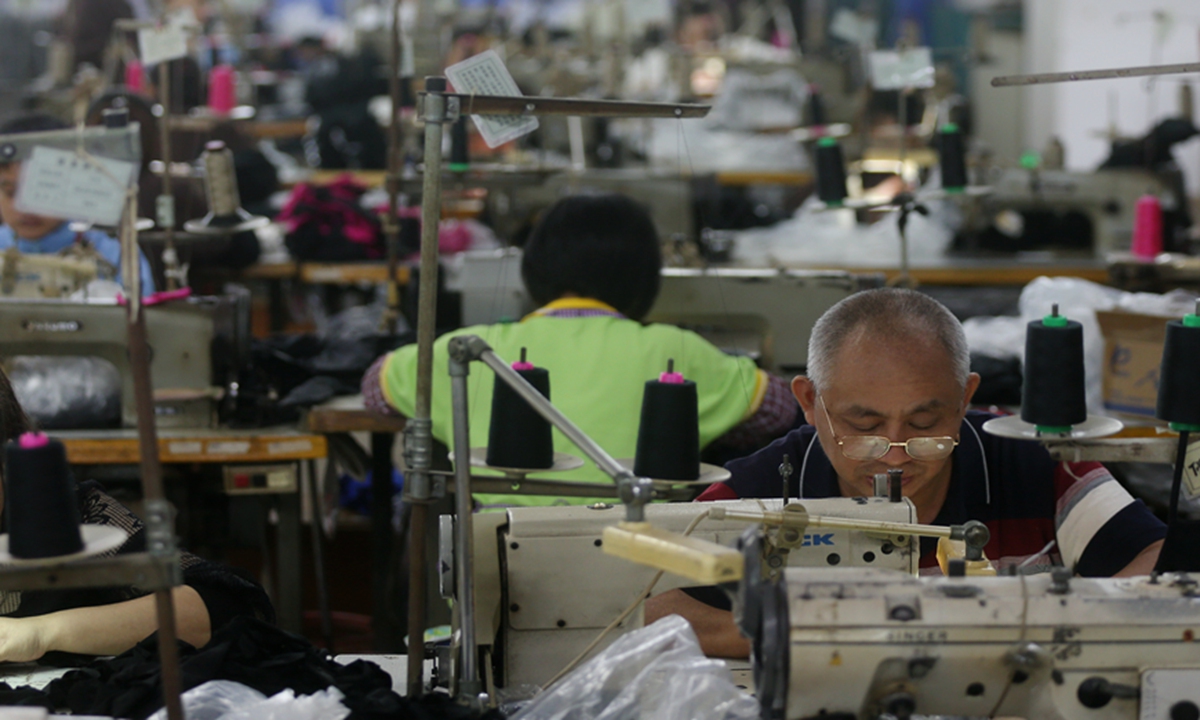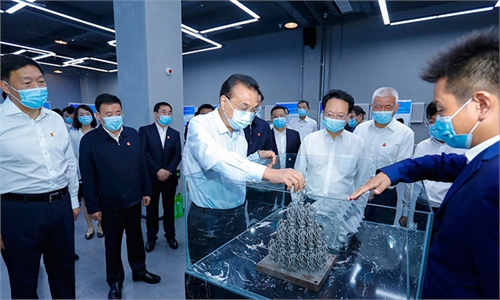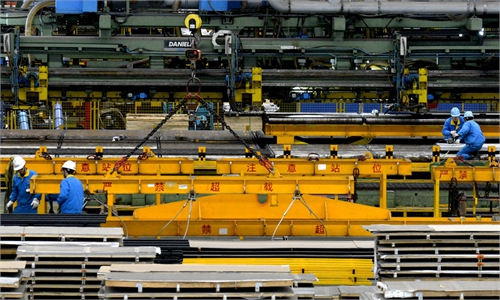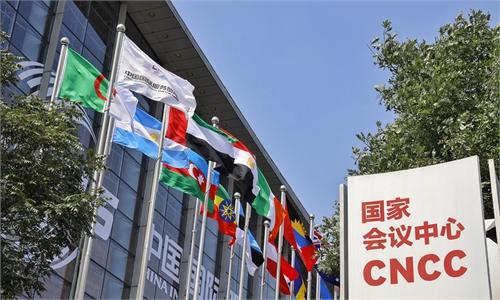
Workers make linen products inside a textile plant in Dongguan, South China's Guangdong Province. Photo: GT/Cui Meng
More policies are needed to increase financing to China's vast group of small and medium-sized enterprises (SMEs) in the second half of the year as the Chinese central government emphasizes the stability of SMEs amid economic headwinds, industry insiders said on Tuesday.
China's vast SME sector is under pressure amid uncertainties of global demand and a slowdown in the pace of the domestic economic recovery. The SMEs' operations face rising challenges, given the increasing commodity prices and persisting financing difficulties.
Against this background, China's central government has pledged more support to the sector.
Pan Gongsheng, deputy governor of the People's Bank of China (PBC), said at a State Council Information Office press conference on Tuesday that financing for small and micro-sized companies has made progress, as the PBC attaches great importance to shoring up SMEs.
Loans to small and micro-sized firms totaled 17.8 trillion yuan ($2.75 trillion) as of the end of July, up 29.3 percent year-on-year, according to Pan.
There were 38.93 million small firms, up 29.5 percent from the same period last year.
Pan said the PBC is expanding quotas for re-lending by another 300 billion yuan, to be allocated during the remaining four months of 2021 at an interest rate of 2.25 percent.
Liang Zhifeng, an official with the Ministry of Industry and Information Technology, said at the press conference that the ministry is formulating one task list, one action plan, and one development plan for the 14th Five-Year Plan period (2021-25.) for the sound development of SMEs.
Those announcements came after Chinese Vice Premier Liu He on Monday vowed unchanged and firm support to the country's private sector, adding that the central government's policy "to support the private sector hasn't changed, and won't change in the future."
Yi Huiman, chairman of the China Securities Regulatory Commission (CSRC), also noted that supporting and facilitating the development of SMEs is a key issue in the global economic recovery. Yi spoke on Monday at a conference organized by the World Federation of Exchanges.
"Currently, the pandemic, rising commodity prices and supply chain issues have formed multiple challenges to SMEs, which are at a difficult stage," Yi said.
Yi noted that the CSRC will strive for a complete chain of the institutional system that allows the capital market to serve SMEs' innovative growth in a faster fashion.
SMEs are the backbones of China's private sector, and they contribute more than 50 percent of taxes, 60 percent of GDP, 70 percent of technological innovation, 80 percent of urban employment, and 90 percent of new jobs and firms.
However, an uncertain global economic recovery is making days difficult for Chinese SMEs.
In August, the Caixin/Markit China manufacturing Purchasing Managers Index (PMI) came in at 49.2 points, marking the first contraction in activity since April 2020 when China was recovering from the pandemic.
"All raw material prices have seen a sharp increase and orders have been slack in recent months," a manager at a magnet producer surnamed Tang in Dongguan, a manufacturing hub in Guangdong, told the Global Times on Thursday.
Financing difficulties for SMEs remain an issue, and the qualifications to get loans have not changed much in the post-virus economy, compared with before, Yang said.
"More often than not, small businesses are told to offer collateral they don't have to get loans from banks," Yang said, noting that a lack of diversified financing products and a low level of matching to serve SMEs still persist.
China rolled out policies to shore up the private sector. In 2020, the country's financial institutions were told to save enterprises 1.5 trillion yuan.
Financial institutions will further cut fees for the real economy and the public, according to a Xinhua News Agency report in July.
China last week announced plans to set up a new stock exchange in Beijing as part of an attempt to support the growth of SMEs and the nation's capital markets.
Xi Junyang, a professor at the Shanghai University of Finance and Economics, told the Global Times on Tuesday that alleviating financing difficulties for SMEs remains a challenging task.
"Next, the government needs to facilitate lending entities that are willing to serve the SMEs to list and thrive on the market. Such institutions' operations need to be compliant with market regulations, and they could fill the gap left by banks, which tend to overlook lending to SMEs," Xi said.
In the first half of this year, 13.94 million new market entities were established nationwide, basically returning to the pre-COVID-19 level, according to the State Administration for Market Regulation.




